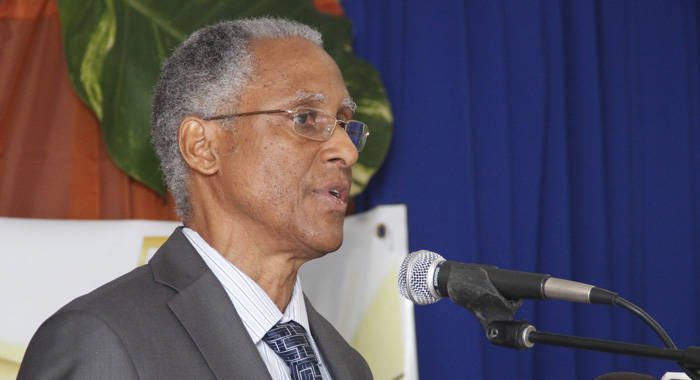A judge with the Caribbean Court of Justice (CCJ) has expressed “surprise” at the court’s “light” caseload in its original jurisdiction, 12 years after it was established.
“After 12 years, it is a little surprising that the court’s original jurisdiction caseload is still as light as it is,” Justice Adrian Saunders said in Kingstown on Tuesday.
“In the appellate jurisdiction, the court has delivered over 140 or so judgments but we have heard less than a dozen cases and delivered about 20 judgments in the original jurisdiction,” he said.
Saunders’ comments came as he delivered a lecture entitled “The Treaty of Chaguaramas: Conflicts and Contradictions for the Island State”.
The lecture is part of the “Issues in International Affairs Lecture Series” organised by the University of the West Indies Open Campus in Kingstown, the Eastern Caribbean Supreme Court and Legalease SVG Inc.
Saunders said that the flow of cases that relate to the treaty — which established the Caribbean Community (CARICOM) — is “very sluggish”.
“The question is why. I can only hazard a few guesses,” Saunders said, adding that he thinks many companies and persons who are prejudiced by the unlawful conduct of CARICOM members states still feel constrained to rely on the delinquent member state for a host of things.
These range from the expeditious and favourable processing of licences, to direct business opportunity.
“They prefer, therefore, to suffer in silence rather than displeasing a government and possibly losing business by bringing legal proceedings,” Saunders said.
The judge said that there was actually a litigant who gave evidence to this effect to the court.
“He said there are other actions that he could bring but if he did so, he believes that spiteful measure would be taken against him.”
Saunders said that another issue is that in its original jurisdiction, the CCJ applies the rules of international law.
“And the vast majority of lawyers in private practice are not experienced in this branch of the law. Many of them have never even read the treaty and they are, therefore, unable or reluctant to advise their clients to institute cases in the original jurisdiction.”
Another consideration is that the vast majority of CARICOM nationals are still ignorant about their rights that proceed from the treaty and about the role of the court in vindicating those rights, Saunders said.
More sensitisation needed?
He said that when the court was established in 2005, it seems that CARICOM could not afford to concentrate any more of its slender resources in widespread public education about these matters, Saunders said.
“In the court’s early years, it attempted itself to do some of this work and judges of the court went to various member states and conducted public education sessions about the treaty and the rights of CARICOM citizens and the role of the court, Saunders said.
“But, interestingly, when we embarked upon our first strategic plan, our stakeholders told us in no uncertain terms that they didn’t consider it seemly that the judges of the court should be doing this kind of public relations work. And so we have cut back considerably on it.”
The judge said that the case of Jamaican, Shanique Myrie — who won a lawsuit against the Barbados government — the public spiritedness of a few Jamaican lawyers who were willing to work pro bono for her, “have demonstrated that with courage, with an abiding faith in the legal system, it is possible to take on a member state and to secure justice”.
The CCJ awarded Myrie US$38,000 after she sued the Barbados government, claiming she was subjected to a dehumanising cavity search by a female immigration officer at Grantley Adams International Airport, locked in a filthy room overnight and deported to Jamaica in March 2011.
Regarding what he finds most significant about the original jurisdiction and the court’s role as the guardian of the treaty, Saunders said: “I would say, without hesitation, that despite the fact that only four countries have acceded to the appellate jurisdiction, despite the challenges we experience, in securing law and order in the region, despite everything you see and hear about the justice system in the region, what impresses me most is that the governments in the region have demonstrated the utmost respect for the court and its judgment.”
He said that after the Myrie decision, CARICOM governments re-examined their protocols relating to admission of entry of CARICOM nationals and made alterations to those protocols to conform with the prescriptions of the court.
The same thing happened when the court decided a case against CARICOM itself, Saunders said.
“Every single judgement of the court has been fully complied with,” Saunders said, noting among them, that Myrie was paid her damages in full by the Barbados government.






